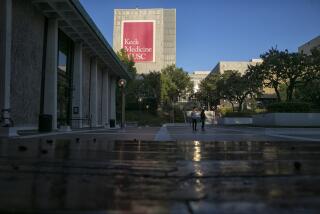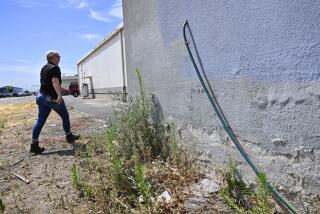UCI Admits Failure to Act on Lab Misdeeds
Senior UC Irvine officials acknowledged Friday that the university failed to act on extensive evidence of wrongdoing by a cancer research lab for three years, despite four internal investigations that found people associated with it had consistently violated federal and university regulations.
UCI Chancellor Ralph J. Cicerone defended the investigations as “thorough and fair” but said the university repeatedly disregarded its own findings, allowing scientists involved in the unauthorized research to go unpunished, and delaying $19,900 in refunds to patients who donated in response to solicitations at the same time they were being treated by the lab. On Friday, UCI sent out letters offering refunds to the families of nine patients asked for donations.
“A case like this, it really makes everybody feel very bad,” Cicerone said. “We are not proud to have had . . . the mischief on this campus.”
In a news conference Friday, Cicerone said the university has taken steps this week to “clean up” the fallout from the lab’s attempts to test its research into using treated white blood cells to attack cancer tumors.
But even as university officials offered mea culpas for their inaction, documents released Friday show more violations of FDA rules by the lab and its key researcher, John C. Hiserodt, than previously disclosed. They include his using an isotope without FDA approval and using the research from the treatment of an 8-year-old Florida cancer patient to support a patent, also a violation of FDA rules.
That patent agreement is one of two with an Irvine pharmaceutical company that the university is trying to sever. The company has licensed the rights to the therapies developed by the lab in treating the Florida girl.
The FDA has launched a criminal investigation into the university’s own finding that Hiserodt violated federal and university rules when he shipped an unauthorized cancer vaccine to Jennifer Turken, the Florida girl, who later died.
Meyer Pharmaceuticals bought licenses for 14 pending patents on technologies and treatments developed by Hiserodt and other researchers at an “immunotherapy” lab at the Chao Family Comprehensive Cancer Center at UCI. The technologies are owned by the Regents of the University of California. Under the terms of the agreements, Meyer funds the research and development of the technologies, and guarantees the university royalties if and when the product goes to market.
Nearly a year ago, Hiserodt, who co-founded Meyer, left UCI during a university investigation and joined the company as a vice president. He is on paid administrative leave.
“We don’t care” if the university loses money by breaking the agreements, Cicerone said. “We will not stick by agreements that are not above-board. . . . I want our campus out of this.”
Since UCI is not a party to the patent agreements, however, Cicerone may not have a choice.
Meyer President Michael O’Neill told the office of the president of the university system more than a year ago that one of the patent applications was suspect because it evolved from the unauthorized treatment on Turken, O’Neill said.
Concerned about its contractual obligations to Meyer, the UC president’s office opted not to nullify the agreements at that time, according to Associate Executive Vice Chancellor William Parker. But UCI officials said they were not notified of the problem or of the decision.
“It’s another example of . . . different parts of the organization acting very responsibly in their area of narrow responsibility, but not coordinating more broadly,” Parker said.
Hiserodt and Gale Granger, another researcher key in developing the therapy, own minority stakes in Meyer Pharmaceuticals, which was created specifically to market the cancer treatment.
Granger, a tenured professor in the college of physical sciences, has been ordered to limit his research and was otherwise “disciplined” for his work at the lab, Parker said, declining to specify the punishment.
Cicerone said he has begun meeting personally with every member of the university’s three Institutional Review Boards, which are made up of faculty members and charged with ensuring that research on campus meets university guidelines. He also said the university had begun Friday sending out letters offering refunds to nine cancer patients solicited for donations.
At least 18 more patients billed directly for the experimental cancer treatments at the UC Irvine Medical Center may have been overcharged, said Mark Laret, the medical center’s director. But Laret said his staff is still reviewing patient records to determine if the overpayments took place and how much should be returned. He said the university will pay interest on all the refunds.
Cicerone called it “vexing” that the university has yet to make the refunds, three years after it first identified the billing problems.
“We have evidence that people had actually decided to return the money, and it never happened,” Cicerone said. “All the way up and down the campus these decisions were made, and yet it was never done.”
Patients were asked to make the donations and payments at the time they enrolled in the clinical trials, Laret said. He said that while it was staff members at the medical center who asked for the money, they were directed to do so by the staff of the laboratory, based at the Chao cancer center.
The money, along with payments solicited from patients at trials conducted by university staff at Good Samaritan Hospital in Los Angeles, went to fund research at the lab, Laret said.
Under federal guidelines, patients involved in clinical trials of experimental therapies or drugs typically pay, either themselves or through their insurance companies, for routine medical costs associated with experimental medical treatments, including blood tests, X-rays and hospital stays, according to the FDA.
But FDA regulations generally prohibit charging patients for experimental treatments or devices, the agency said.
University officials said they believe that the overbilling problems were limited to patients involved in trials of the therapies developed by the cancer lab. But they said the university does not have the resources to be sure.
“Is there a problem out there somewhere? We can’t assure you that there is not,” Parker said. But the lab was “an anomalous case. Is there another scandal out there of this magnitude? The likelihood of that is near zero.”
Laret said the medical center plans to institute a new billing system to better track patient payments, and to train its staff to better recognize and alert supervisors to potential problems.
“We know there are gray areas,” Cicerone said. “But we have to stay on the right side of the gray area.”







